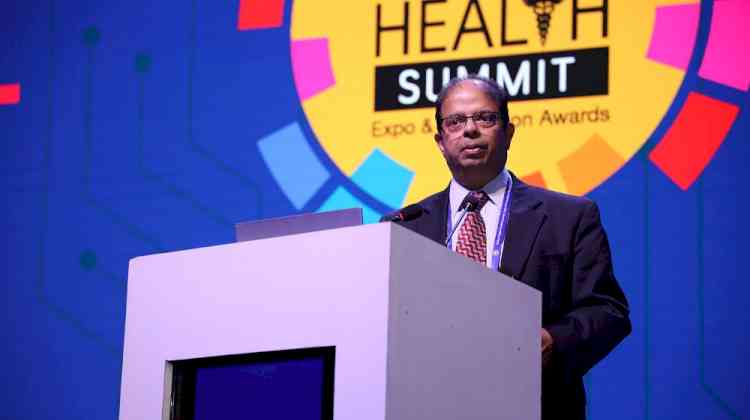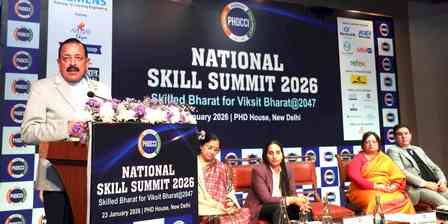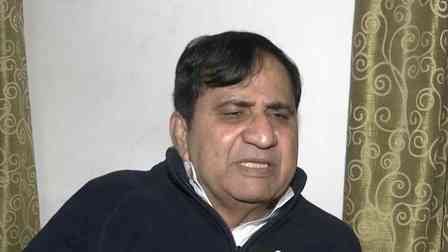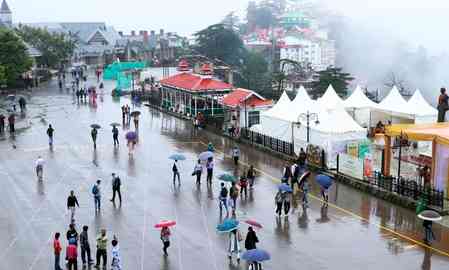Global Digital Health Summit defines roadmap for making India global leader in Digital Health Implementation
In a significant testament to the Government of India's commitment to delivering quality healthcare services to its citizens, the eSanjeevani telemedicine app has emerged as a transformative force, impacting millions of lives. Dr. Sanjay Sood, Project Director of eSanjeevani at the Centre for Development of Advanced Computing, Ministry of Electronics and Technology, shared remarkable insights into this ground-breaking initiative during the Global Digital Health Summit 2023.

Mumbai, September 3, 2023: In a significant testament to the Government of India's commitment to delivering quality healthcare services to its citizens, the eSanjeevani telemedicine app has emerged as a transformative force, impacting millions of lives. Dr. Sanjay Sood, Project Director of eSanjeevani at the Centre for Development of Advanced Computing, Ministry of Electronics and Technology, shared remarkable insights into this ground-breaking initiative during the Global Digital Health Summit 2023.
Dr Sood was speaking at the Global Digital Health Summit 2023, which is a premier event at the forefront of healthcare innovation. This summit convenes global leaders, healthcare professionals, and tech pioneers to explore the latest trends and breakthroughs in digital healthcare. Attendees engaged in panel discussions, thought-provoking talks, and technology showcase encompassing topics like telemedicine, AI-driven healthcare, robotics, and remote patient monitoring. With ample networking opportunities and interactive workshops, this summit served as a mega-hub for collaboration and knowledge exchange.
On the occasion, Dr. Sood highlighted the exponential growth of eSanjeevani, with its user base expanding more than two and a half times in just one year. An astonishing three million downloads of the app have been recorded, and notably, around 10 percent of users are senior citizens.
To ensure the acceptance of telemedicine apps, Dr. Sood stressed the importance of mimicking hospital services in their workflow, offering a simple interface, and having the capacity to scale up instantly.
Dr. Rajeev Raghuvanshi, Drugs Controller General of India, CDSCO, Government of India, discussed the future of medical devices, emphasising the shift from hardware to software integration within the healthcare system. He highlighted the continuous innovations in this space, predicting that software-driven activities would soon become indispensable.
Acknowledging India's unique challenges, including a vast population, limited health literacy, and economic disparities, Dr. Raghuvanshi underscored the pressing need for significant improvements in health infrastructure. He called for a shift in mindset, urging a transition from a physical-driven to a software-driven healthcare system.
Dr. R K Srivastava, Former Chairman of the Medical Council of India & Director General of Health Services, Government of India, identified digital technology as the linchpin of healthcare's future. He praised the receptive nature of Indian doctors and the proactive stance of the government in embracing digital technology, highlighting their pivotal roles in delivering improved healthcare services.
The second day of the Global Digital Health Summit 2023 introduced a trio of pioneering healthcare initiatives designed to reshape the industry landscape. The Asia Pacific DTx Leadership Alliance spearheads the widespread adoption of Digital Therapeutics (DTx) solutions across the region, fostering innovation and enhancing patient outcomes. Health Parliament unveiled the Digital Doctor Leadership Maturity Model (DDLMM), a structured roadmap for clinicians, globally to seamlessly integrate technology, quantifying its impact on clinical processes and outcomes. 'Mission SCALE,' launched in response to the vital role of digital health startups, aims to catalyse their growth by uniting global leaders, startup founders, and investors to empower these startups in driving positive transformation within the healthcare sector. Together, these initiatives represent a significant step towards revolutionising healthcare through digital innovation and collaboration.
Harkesh Mittal, Chairman of the Startup India Seed Fund Committee, celebrated India's remarkable progress in becoming a global vaccine leader. He recalled the days when vaccination costs were prohibitive, and digitisation through Aadhar has since streamlined vaccination records, ensuring a path to better healthcare services in the future.
Bakul Patel, Senior Director of Global Digital Health Strategy & Regulatory at Google, emphasised the transition of technology from consumer to medical device applications. He noted the shift from a predominantly hardware-focused industry to one where software plays a central role. Mr. Patel highlighted the promise of digital healthcare in predicting symptoms before they manifest and the precision achieved in robotic surgery, down to the micro-millimetre level.
Dr. Jitendra Sharma, MD & Founder CEO of Andhra Pradesh MedTech Zone Ltd, emphasised the importance of both hardware and software working in harmony for healthcare systems to flourish. He identified compatibility, convergence, and cost as critical elements for the evolution of healthcare standards.
N. Nawin Sona, IAS, Secretary of the Public Health Department, Government of Maharashtra, expressed India's readiness to adopt cutting-edge technology in healthcare, including the use of drones for telemedicine. He pointed out to the need for tech and IT training for healthcare professionals and advocated for public and private sector collaboration to ensure the seamless delivery of digital healthcare services.
Sona highlighted the scarcity of medical history records in India and the potential benefits of storing health data in the cloud, including building patient histories and facilitating anonymised data donation for research, particularly in cancer studies. He also foresees blockchain technology facilitating insurance claims processing and smart contracts expediting approval processes in the near future.
Sanjiv Navangul, MD and CEO, Bharat Serums, illuminated the pharmaceutical industry's journey into Health 4.0. Recognising the patient's evolving role as a healthcare consumer, he stated that there is a historical trust deficit within the industry.
“Today, we have a unique opportunity to reshape this narrative. By fostering stronger connections with stakeholders, harnessing the potential of social media, and embracing digital technology, we can usher in a new era of trust. This transformation enables us to personalize patient care profoundly, ensuring that individual needs and preferences guide our approach. It's not just an operational shift; it's a chance to build transparent, robust relationships with the people we serve." He said.
Ann Mond Johnson, CEO, American Telemedicine Association highlighted the huge opportunity that India has in the telemedicine space. “India has one of the largest numbers of internet connection and smart phone consumers in the world. People in India are also comfortable using mobile phones for financial transactions as compared to other countries like the US. This is why we believe that there would be a faster penetration of digital healthcare services in India.”
Dr. Rajendra Pratap Gupta, Chair of the Global Digital Health Summit, encapsulated the essence of the two-day summit by stating, “At the Global Digital Health Summit 2023, we marked a historic milestone in Indian healthcare. For the first time, we welcomed a robot as part of our esteemed panel. This symbolises the ever-evolving landscape of healthcare technology. His key message to the doctors, hospitals and the pharmaceutical industry was, that it was not the time to wait and watch, but adopt and scale up technology in the entire value chain. He further said ‘ medical science and technology will create healthcare and either of them, just sickcare’. Together, humans and technology will chart the path to a healthcare future that is both innovative and profoundly human-centric, ensuring the best possible care for all.,”
These insights from key figures demonstrate India's unwavering commitment to harnessing digital technology to reshape and enhance its healthcare landscape, ensuring better access and quality healthcare services for all its citizens.
The event also featured the prestigious Innovation Awards and Special Jury Awards, recognising outstanding contributions and achievements in the field of healthcare innovation and digital technology.


 City Air News
City Air News 










